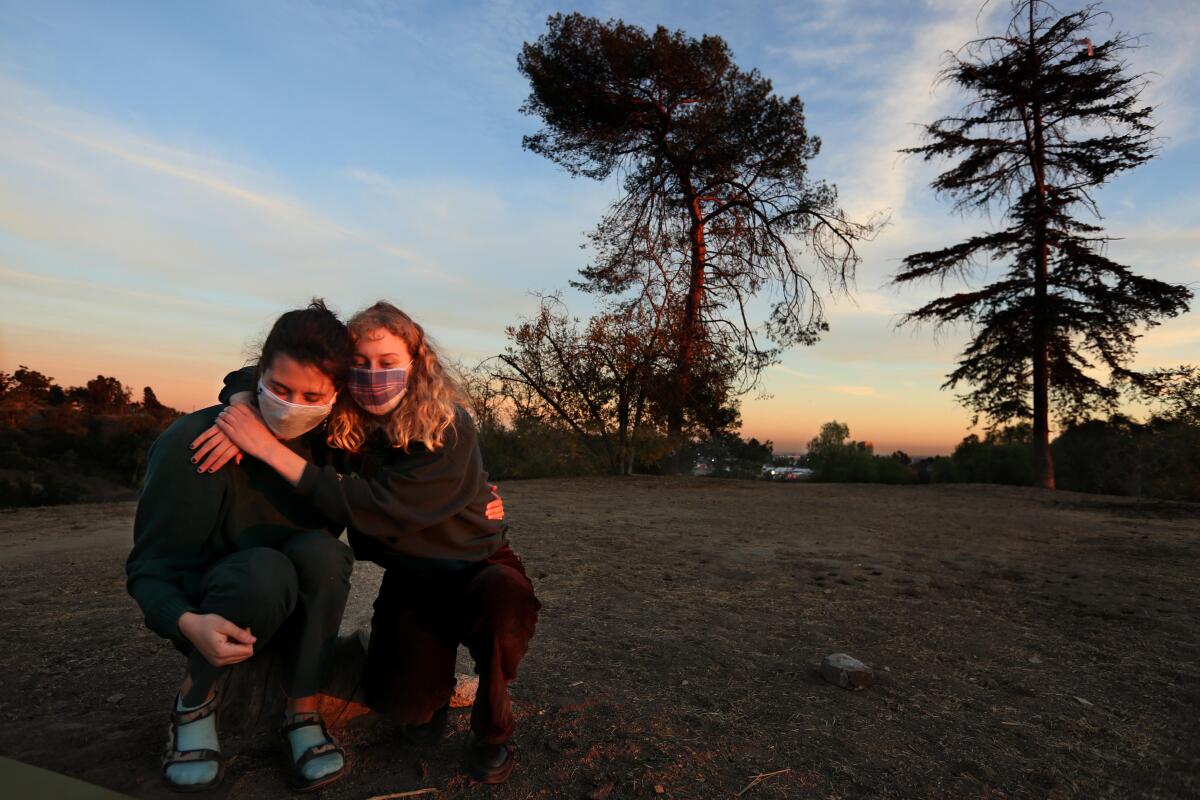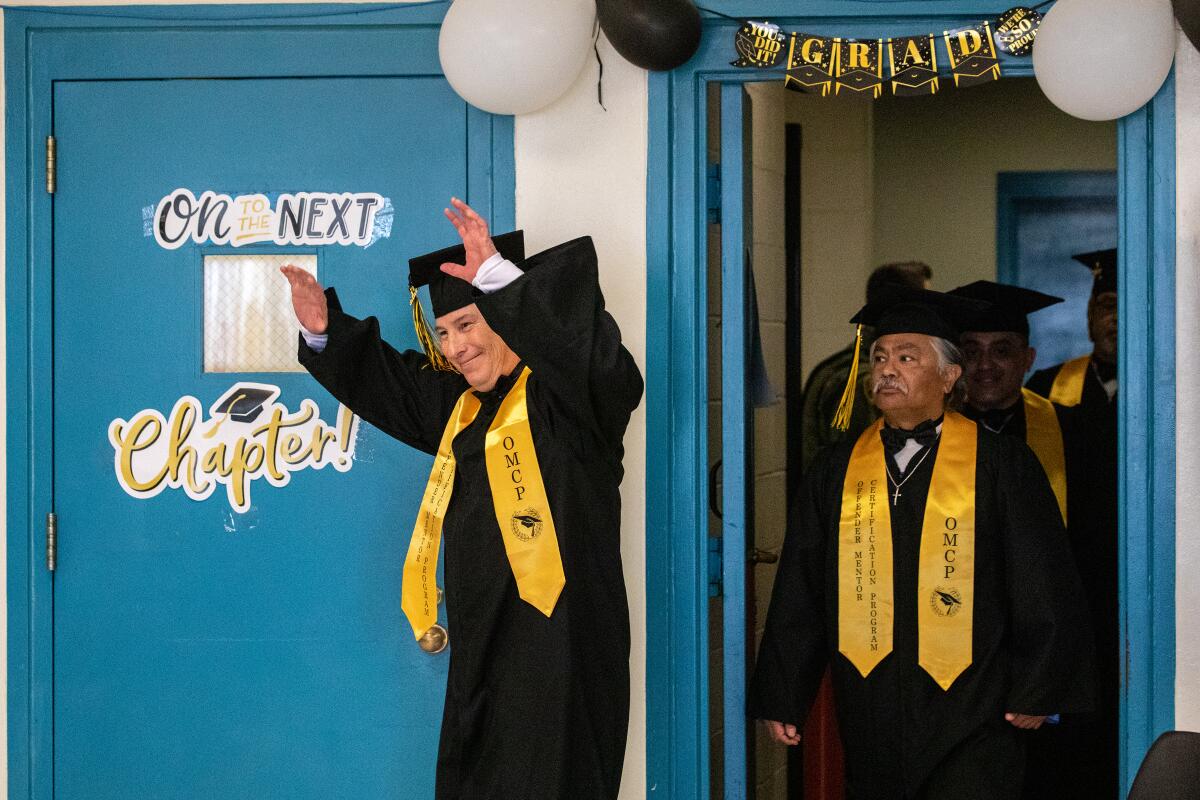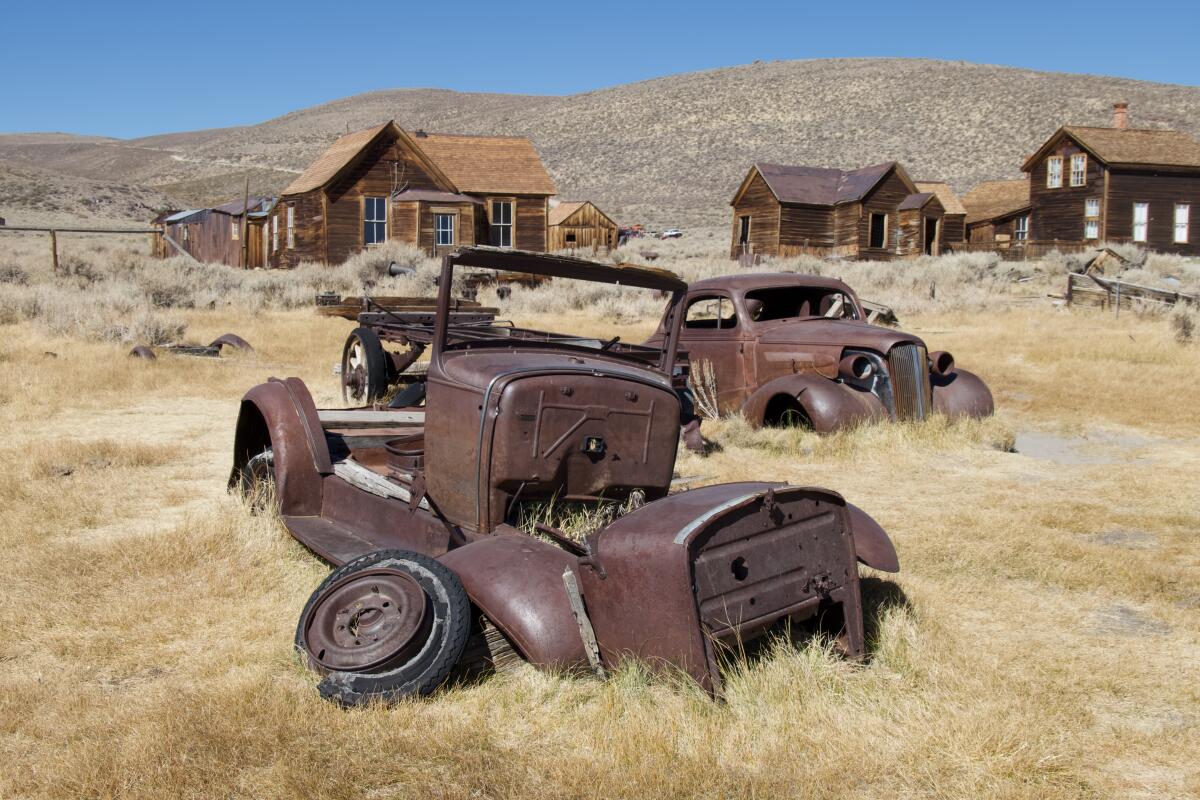Here’s how the pandemic changed Californians’ lives (in your own words)

Good morning, and welcome to the Essential California newsletter. It’s Monday, March 13.
Californians entered March with the state’s COVID emergency order newly lifted. In three years of a global pandemic, many aspects of our daily lives changed. Some familiar features seem to have circled back to something resembling normal, but the long-lasting impacts of a global health crisis can’t easily be quantified. That’s why we wanted to hear from Californians directly and give them a space to share their experiences.
Last week, we asked how your lives changed since March 2020 and how you were dealing with the long-term effects of the pandemic. Hundreds of readers have responded with unique, personal stories that include not just those affected by the virus itself, but the loss of family members and friends, layoffs, career changes, adapting to remote school and work, big moves, new beginnings and much more.
Reading through your responses, a few common words stood out.
Isolation. Anxiety. Depression. Frustration.
As reader Chris M. from Los Angeles concisely put it:
“My life became small.”
But I also noticed themes of families brought closer together, people finding community despite social distance and some feeling more human than they had before March 2020.
Despite the upending of our routines and much of our social fabric, a good share of responses centered on positivity. For some families, being stuck at home together led to stronger emotional bonds. Some of you noted shifts in your outlook on life, recalibrations of priorities and rediscovering sources of joy and meaning.
“I live a much simpler life now,” wrote Fritzi L., of Redwood City. “Everything has come back, but I see opportunities in a different perspective. I found a wonderful stillness and I don’t want to lose that.”
Through it all, many readers expressed their constant worry about getting sick with COVID-19 due to age or other health issues that put them at higher risk. Many of you are still avoiding large gatherings and continue to wear masks at grocery stores and for other essential trips.
Here’s a sampling of what you told us about how your lives changed and how you’re dealing with that (edited for clarity and brevity). We don’t have the space to include all of your responses, but I want to thank everyone who spent time writing to us and opening up about their experiences.
“I have lived in fear for the past three years because I see the loss that others have suffered due to this pandemic and I wouldn’t be able to handle the loss of anyone — especially my parents and grandma. So my fear became overwhelming and consuming and dictated how I lived. Slowly, I have had to adjust to live with the pandemic in the background and realize that living like the other shoe is going to drop is doing harm to me... The only way to live is with hope and peace of mind that I am doing everything I can to protect myself and the others around me.”
— Nicolette B., Los Angeles
“My son was in the prison system. My husband’s and my weekend visits to see him — no matter which prison he got shipped to — was our lifeline to sanity. I knew the weekend that we visited him in Susanville that it would be our last for a long time. The prison system shut down all family visiting. Our ‘visits’ became 15-minute phone calls whenever he was allowed to call. When the phone rang, I stopped everything to answer — it could be him. My son is home now! But I still jump when the phone rings.”
— Brenda L., Pasadena
“[Living with a] disability means others’ isolation and lockdown is my normal life. The biggest impacts were discovering that I was immunocompromised and just how many people consider my life not worth wearing a small piece of cloth over their face ... it will be March 2020 for the rest of my life.”
— Eric M., Bakersfield
“Due to doctors’ office closures, I delayed treatment for heavy bleeding and ended up in the ER, anemic, requiring three blood transfusions. Weeks after a hysterectomy my mother called me to say she delayed treatment on a lesion only to find she had oral cancer. ... My lifeline was my father, who lifted me up daily on long phone calls. Then he called to tell me he was short of breath and headed to the ER. Days later he died alone in a COVID ICU. Six weeks later my mother died from terminal cancer in hospice. But I was able to say goodbye and tell her how much I loved her. Just like that I lost both parents mere weeks apart. I have newfound empathy for anyone experiencing serious health issues, and a deep and profound loathing of U.S. healthcare.”
— Helen M., Los Angeles
“I was making a great living as a freelance artist. Lost all of my jobs and was evicted before laws were in place to protect us. I started an LLC working with PPE sector and slowly began to put my financial life back together, driving three hours to work in L.A., then driving back each day. I caught COVID twice. Thankfully I had my dog the whole time. I eventually thrived, but that first year and all the struggle and trauma still sticks with me.”
— Jenifer Y., Los Angeles
“My son, who was in seventh grade when lockdown started, had to attend school from home. We were lucky he is self-motivated and continued to do very well in school and we felt fortunate to get to spend more time with him, though he would have been better off in school. It affected his ability to socialize and I don’t know how it will affect him in the future.”
— Suju V., Los Angeles
“My job was eliminated in March 2020 due to the pandemic. I worked in education sales ... all the schools closed = no business. It was a very abrupt, shocking experience that took me four months to get over emotionally. I was very compliant on the pandemic rules but many friends were not, and it harmed friendships.
It turns out losing my job was actually really beneficial. I now work virtually part time and love my role as an adjunct professor and am much happier, but only make 25% of my previous wages.”
— Deborah D., Fresno
“Lost my job, left my marriage — and San Francisco with it — with three kids and our dog and found our way to L.A. The four of us moved into my childhood bedroom, took a cross country road trip, moved into our new home ...
A challenging return to school, plus the divorce, adolescence and move pushed us to the edge with severe mental health challenges and unbelievably limited supports. While we have a long way to go, the pandemic is very much a critical part of our journey that pushed us into different spaces and forced us to confront realities in ways that are both scarring and healing.”
— Jess S., Los Angeles
“I still wear a mask when I go out where there will be lots of people. I’ve been yelled at in grocery stores by people telling me I don’t need to wear a mask — even going so far as to follow me around a grocery store. This has been an ongoing issue since the early days of the pandemic and continues today. Truly mind-boggling. I’m easing my way into going to live concerts and I’ve got to say, it sparks so much joy.”
—Michelle B., Atascadero
“Ten months ago our 31-year-old daughter got COVID for the first time and it turned into long COVID. This has been very disabling for her in all aspects of her life. Since she is single and lives alone, we have to stay virus-free in order to help her. COVID changed our lives in a profound way and we don’t see an end to that reality for us.”
— Lori R., San Diego
“I am retired and the pandemic increased my sense of isolation and led to my feeling disconnected from my community. I am of a generation that has never used social media to keep in touch. For me, not being able to see and interact with friends face to face was very difficult. In addition, I lost a loved one (not to COVID) during this time, which amplified my feelings of loneliness.”
— Paul Z., Palm Springs
“I was teaching high school math when the virus hit. The shock of switching to Zoom teaching in the spring of 2020 was incredibly hard for all involved. I realized it would take me two years [or more] to really develop the skills needed to match the effectiveness of in-person teaching. I retired that summer.”
— Jot M., Watsonville
“I’m still finding it very difficult to re-engage with the world. It does not seem welcoming.”
— Melinda U., Los Angeles
“My wife is with the USPHS [U.S. Public Health Service], so she was immediately deployed, so my sons and I were at home, living in our quarantined home, together. One son was a student at Norwich [and] he came home, plus my high school son and middle school son. We were four men/boys, living and working together. I believe I am closer to them than I otherwise would have been. We learned how to live and collaborate and be close.”
— Patrick B., Napa
“I no longer have an hour commute daily each way, which is great, but it feels like Groundhog Day — Every. Single. Day. The pandemic has taught me that life can be cut short unexpectedly, so one needs to cut out the crap that bothers you in life and pursue things that make you happy.”
— Laura C-R., Suisun City
“I have became very discouraged at the rise in bad behavior from many people I had thought were regular citizens; neighbors saying horrible xenophobic things on the internet and strutting around with their hateful banners. ... The isolation and disruption of normal routines seemed to bring out the worst in many, although it did bring out the best in others. I now think [that], when under unrelenting duress, one third of humans easily become villains, one third become heroes, and one third just plug along as best they can.”
— Stephanie C., Auburn
“With five risk factors, I have been very careful, seldom leaving home. The way the whole country is pretending the pandemic is ‘over’ when COVID-19 variants are still present and becoming more infectious, seems so wrongheaded and dangerous.”
— Sandra W., Richmond
“The hardest was losing my dad — not to COVID, but a stroke in the summer of 2020. We were being asked to make end-of-life decisions without being able to see or talk with him. We got tested, pushed on the hospital and with the help of his social worker, were able to see and spend his last few days with him.
The worst is still worrying that COVID could hurt our last remaining parent, who is 87 years old and has a compromised immune system.”
— Bridgit P., Danville
“To me, it has had the biggest impact on my mental health. Whenever I felt a period of anxiety or depression, I noticed how most people, right away, would turn and say: ‘Yeah, this pandemic has affected a lot — in more ways than one,’ (which is true) but not acknowledge that it has just manifested it for those who have felt this way long before March 2020, including myself. I am glad it finally had people talking more openly [about mental health] than ever.”
— Raymond B., Westminster
“I am a very social person and acutely felt the loss of gatherings and travel. I made good use of virtual hangs. We ‘Zoomies’ still meet online and have more connection than before. I do not feel that human behavior has improved with isolation and find myself wary of people who would accost me over my mask or my distance from them.”
— Lori S., Half Moon Bay
“Our adult children still live in fear of my husband and myself — both over 75 — getting COVID. That makes me sad as my husband and I really focus on trying to live life to the fullest. We are careful and fully vaccinated. I can not talk them out of their anxiety. I see drastic changes in some of my grandchildren. They seem much more fearful and anxious, and perhaps less spontaneous and joyful.”
— Trudy D., Chico
“I [became] more insular, which perhaps wasn’t so good. I’m slowly coming out of the bubble I created and trying to be less misanthropic. I want to enjoy some of the social interactions I had pre-pandemic, but I’m more wary than I used to be.”
— Laura M., Altadena
And now, here’s what’s happening across California:
Note: Some of the sites we link to may limit the number of stories you can access without subscribing.
Check out "The Times" podcast for essential news and more
These days, waking up to current events can be, well, daunting. If you’re seeking a more balanced news diet, “The Times” podcast is for you. Gustavo Arellano, along with a diverse set of reporters from the award-winning L.A. Times newsroom, delivers the most interesting stories from the Los Angeles Times every Monday, Wednesday and Friday. Listen and subscribe wherever you get your podcasts.
POLITICS AND GOVERNMENT
Los Angeles teachers plan to join a three-day strike led by their school district’s non-teaching workers. The union representing 30,000 cafeteria workers, bus drivers, custodians, special education assistants and other L.A. Unified workers is at an impasse in negotiations with district officials for higher pay. Los Angeles Times
In response to the second-largest bank failure in U.S. history, the heads of three federal agencies said Silicon Valley Bank customers would be fully protected after the lender’s failure. The Treasury Department, Federal Reserve and FDIC announced steps meant to protect the bank’s customers and prevent further runs. Los Angeles Times
CRIME, COURTS AND POLICING

Twenty incarcerated men at California State Prison in Lancaster donned caps and gowns for a pivotal graduation ceremony. They completed their training as alcohol and drug counselors, which could help them secure new careers once they’re released.
Los Angeles Times
At least eight people were killed Saturday night when two suspected smuggling boats capsized in the waters off Black’s Beach in San Diego. Officials say it is one of the deadliest maritime events in the city’s history. San Diego Union-Tribune
Support our journalism
HEALTH AND THE ENVIRONMENT
This weekend’s destructive downpour will be followed by yet another atmospheric river, forecast to arrive in Northern California on Monday evening. Officials are working to assess the damage from severe flooding along the Central Coast and Central Valley as this new round of rain approaches, bringing fears of even more flooding.
Los Angeles Times
Californians who received the bivalent COVID-19 booster when it first rolled out more than six months ago might be wondering: When is it time for another shot? The word from health officials isn’t fully clear. San Francisco Chronicle
Scientists and environmental groups seeking federal protections for California’s Joshua trees still haven’t found what they’re looking for. In their second review, U.S. Fish and Wildlife Service officials declined to list the iconic yuccas under the federal Endangered Species Act. The Desert Sun
CALIFORNIA CULTURE
ICYMI, the 95th Academy Awards happened Sunday. We have the list of 2023’s Oscar winners and other highlights from Hollywood’s big night. Los Angeles Times
Free online games
Get our free daily crossword puzzle, sudoku, word search and arcade games in our new game center at latimes.com/games.
AND FINALLY
Today’s California landmark comes from Alice-Ann Whiteneck of Walnut Creek: the ghost town of Bodie.

Alice-Ann writes:
Bodie was a former mining town. The community as it was is still intact, in various stages of decay. One will find old machinery, cars, etc. still lying around.
What are California’s essential landmarks? Fill out this form to send us your photos of a special spot in California — natural or human-made. Tell us why it’s interesting and what makes it a symbol of life in the Golden State. Please be sure to include only photos taken directly by you. Your submission could be featured in a future edition of the newsletter.
Please let us know what we can do to make this newsletter more useful to you. Send comments to [email protected].
Sign up for Essential California
The most important California stories and recommendations in your inbox every morning.
You may occasionally receive promotional content from the Los Angeles Times.




